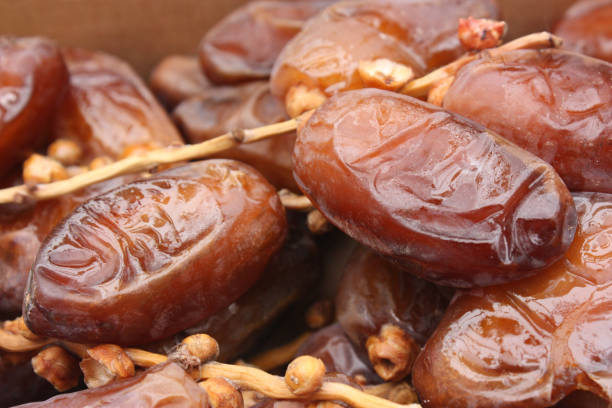Kurma Bertangkai: The Main Challenges for Date Farmers in Malaysia

Introduction
Malaysia’s date industry has made significant strides in recent years, contributing to the country’s agricultural sector and economy. However, date farmers in Malaysia face numerous challenges that impact the cultivation and production of kurma bertangkai. From climate variability to labor shortage, these obstacles require innovative solutions and support to ensure the sustainability of the date industry. In this blog post, we will delve into the main challenges faced by date farmers in Malaysia and explore potential strategies to overcome them.
1. Climate Variability and Unpredictable Weather Patterns
One of the primary challenges for date farmers in Malaysia is climate variability and unpredictable weather patterns. Dates require specific climatic conditions to thrive, including warm temperatures, low humidity, and minimal rainfall. However, Malaysia’s tropical climate, characterized by high humidity and frequent rainfall, poses a significant obstacle to date cultivation.
The unpredictable weather patterns, including prolonged rainy seasons and unexpected storms, can lead to poor pollination, reduced fruit quality, and increased susceptibility to diseases. Date farmers must implement strategies such as proper drainage systems, protective structures, and careful selection of date varieties that are more resilient to withstand these climatic challenges.
2. Water Management and Irrigation
Effective water management and irrigation pose another significant challenge for date farmers in Malaysia. Dates are relatively water-intensive crops, requiring regular irrigation throughout their growth stages. However, water scarcity and limited availability of quality water sources can pose significant challenges.
Date farmers need to adopt efficient irrigation techniques such as drip irrigation or micro-sprinkler systems to optimize water usage and minimize wastage. Additionally, implementing water conservation practices, such as mulching and soil moisture monitoring, can help preserve water resources and improve overall water management on date farms.
3. Pests and Diseases
Pests and diseases present a constant threat to date farmers in Malaysia. Common pests affecting date palms include aphids, mites, and fruit flies, while diseases such as bayoud disease and fusarium wilt can cause severe damage and yield loss.
To combat these challenges, date farmers must prioritize integrated pest management practices, including regular monitoring, early detection, and the use of biological controls and eco-friendly pesticides. Additionally, maintaining proper hygiene and sanitation in date plantations can help prevent the spread of diseases and minimize their impact on crop health.
4. Labor Shortage and Skilled Workforce
The availability of skilled labor is a persistent challenge faced by date farmers in Malaysia. Date cultivation requires specialized knowledge and expertise, including pruning, pollination, and harvesting techniques. However, the younger generation’s preference for urban employment and a lack of interest in agricultural careers have resulted in a shortage of skilled labor in rural areas.
Efforts are needed to promote agricultural education and training programs that equip aspiring farmers with the necessary skills and knowledge to thrive in the date industry. Additionally, providing incentives and support to attract and retain skilled workers in rural areas can help address the labor shortage issue.
5. Market Access and Value Chain Integration
Market access and value chain integration pose significant challenges for date farmers in Malaysia. Establishing reliable market linkages, ensuring fair prices, and navigating the complexities of the supply chain can be daunting for small-scale date farmers.
To overcome these challenges, farmers can explore partnerships with government agencies, cooperatives, and private organizations that facilitate market access and provide support in terms of quality control, packaging, and marketing. Strengthening market linkages and promoting value-added products derived from dates can also enhance the profitability and competitiveness of Malaysian date farmers.
Conclusion
Date farming in Malaysia is not without its challenges. Climate variability, water management, pests and diseases, labor shortage, and market access are among the primary obstacles faced by date farmers. However, with targeted interventions, innovation, and collaboration between stakeholders, these challenges can be overcome. By addressing these issues, Malaysia’s date industry can thrive, contributing to agricultural development, economic growth, and the preservation of the traditional kurma bertangkai.
Key Highlights:
– Climate variability and unpredictable weather patterns pose challenges to date farmers in Malaysia, affecting pollination and fruit quality.
– Water management and irrigation are crucial for date cultivation, but water scarcity and limited availability can be challenging.
– Pests and diseases, such as aphids and bayoud disease, threaten the health and yield of date palms.
– The labor shortage and a lack of skilled workforce impact date farming in Malaysia.
– Market access and value chain integration are essential for small-scale date farmers to thrive.
In conclusion, while date farmers in Malaysia face several challenges, including climate variability, water management, pests and diseases, labor shortage, and market access, these obstacles can be addressed through innovative solutions, collaboration, and support from various stakeholders. By overcoming these challenges, Malaysia’s date industry can flourish, contributing to agricultural development and economic growth while preserving the traditional kurma bertangkai.